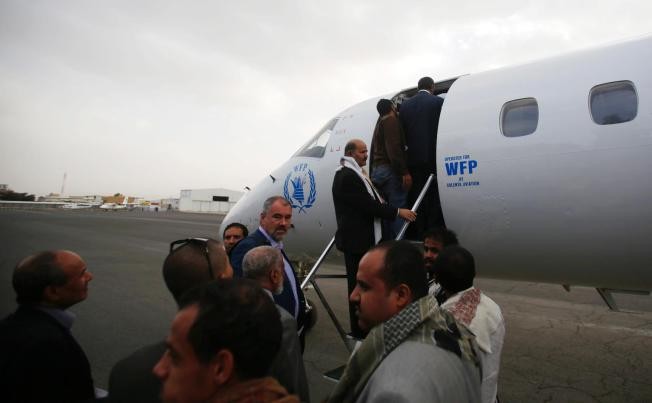(VOVworld) – The crisis in Yemen can turn into a civil war with prolonged instability if peace efforts fail to yield practical results. Military options can not resolve the root of differences, while negotiations will hardly succeed due to complexity of the crisis.
 |
|
Yemeni political groups, including Shiite rebels known as Houthis, get on an airplane for Geneva for U.N.-led peace talks at the airport in Sanaa, Yemenye, Sunday, June 14, 2015.
(AP Photo/Hani Mohammed)
|
The latest round of negotiations, which started on Monday in Geneva is the UN’s effort to break through the impasse following two months of Saudi-coalition airstrikes in Yemen. The UN expects that discussions can generate a new driving force to build trust among factions in Yemen, benefit the people, reduce violence, and support humanitarian activities.
Effort to hold peace talks
Previous peace talks mediated by the Arab League or the UN all failed. The Yemen national dialogue mediated by Saudi Arabia on “Saving Yemen and Building Federal State” took place in Riyadh without the Shiite Houthi rebels, who are controlling Sanaa and some northern provinces and cities. The peace talk in Switzerland in May was postponed due to opposition from forces loyal to the Yemeni President in exile, who requested the Houthi rebels to leave major cities and acknowledge President Adeb Rabbo Manour Hadi. Meanwhile the Houthi rebels set a ceasefire as a precondition for negotiation.
The UN Secretary General has called on all parties not to set any precondition. UN special envoy Cheikh Ahmed appreciated the participation of negotiating delegations in Geneva and encouraged them to seek common solutions to improve the humanitarian situation in Yemen, restore peace, and ensure an orderly transitional process.
Complexity of the crisis
The crisis derived from sectarian differences between the Sunni and Shiite Islam in Yemen and the Middle East in general. Most of Yemenis are Muslims and divided into Sunni and Shiite Zaidi religious groups, which contradict over who succeeded Prophet Mohamed. The Sunnis dominate the southern and southeastern regions and the Shiite Zaidis dominate the northern and northwestern region. Conflicts between the government and the Shiite Houthi rebels in Yemen’s northern region has smouldered since 2009. The “Arab spring” movement broke out, President Sleh was ousted in 2011, and Mansour Hadi took the presidential post. Houthi rebels forced President Hadi to resign after they took control of Sanaa capital in January, 2015.
In February, 2015, conflicts forced Hadi to flee to Aden city in the south. The Houthi rebels continued to attack Aden to force Hadi to live in exile in Saudi Arabia. Tensions have escalated since March 25 when the Saudi-led coalition supporting President Hadi, including 10 Arab and four Gulf states, began airtrikes to prevent the Houthi rebels’ advancement to the south.
The situation has become more complicated when Yemen becomes a stronghold of Al-Qaeda. When Islamic extremist groups in Yemen and Saudi Arabia merged into the Al-Qaeda terrorist group in the Arabian peninsula, it has become the world’s biggest training center of terrorists. Conflicts between the Shiite Houthi backed by Iran and the government of President Hadi, a Sunni politician, backed by the Saudi-coalition have spread beyond control.
A slim chance
Saudi-coalition’s fierce airstrikes could neither change the power balance in Yemen nor bring exiled President Hadi back to office. The Houthis have kept its occupied territories including Sanaa, but cannot further expand its control. Conflicts have killed nearly 2,000 civilians and injured approximately 8,000 others. Over 25 million people have been made homeless. More than half of Yemen’s population lives dependently on foreign relief aid. Violence and fuel shortages have obstructed the operations of hospitals, enterprises, power plants, and traffic.
Yemeni people hope that the Geneva talks can reach a ceacefire throughout the Ramadan month, heading toward a roadmap on Yemen’s political future.